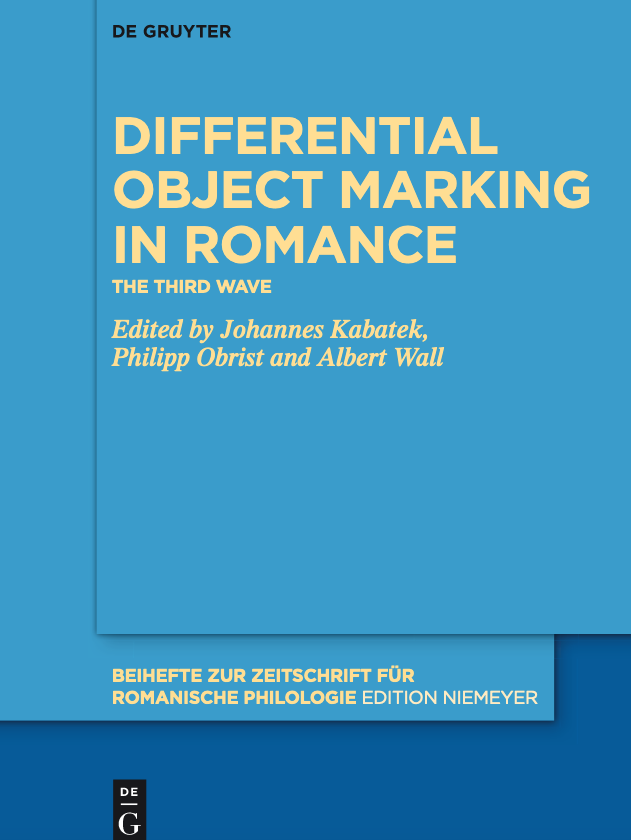Experimentelle Morphosyntax romanischer Sprachen. Untersuchungen zur Objektmarkierung im Portugiesischen und Rätoromanischen
Zusammenfassung
Sprache hat man traditionell vor allem mit zwei Datentypen untersucht: man schaut, wie Leute schreiben oder sprechen oder man stellt ihnen Fragen zu bestimmten Formen. In dem Projekt werden wir hingegen mit Experimenten arbeiten, mit Akzeptabilitäts- und Produktionsexperimenten, was einerseits eine gezielte Untersuchung, andererseits die Vergleichbarkeit der Daten ermöglicht. Unser Thema ist dabei die Markierung von Objekten in romanischen Sprachen; auf der Basis der Expertise im Bereich des Spanischen wird nun das Portugiesische und das Rätoromanische (v.a. das Engadinische) experimentell untersucht.
Wer Spanisch lernt, stösst schnell auf ein Phänomen, das die Linguistik mit einem Terminus des Zürcher Linguisten Georg Bossong als "Differentielle Objektmarkierung" (DOM) bezeichnet. Man sagt: 'veo la casa', "ich sehe das Haus", aber "veo a la maestra" - "ich sehe die Lehrerin". Bei bestimmten Arten von Objekten (etwa bei Personen oder Personalpronomen) muss ein "a" gesetzt werden. Das Phänomen gibt es in zahlreichen Sprachen der Welt in ähnlicher Form; im Bereich der romanischen Sprachen u.a. im Rumänischen, Sardischen oder Neapolitanischen. Die zwei romanischen Sprachen, in denen es zwar DOM gibt, es aber am unklarsten ist, wie es genau funktioniert, sind das Portugiesische und das Rätoromanische (speziell das Engadinische). Nun wollen wir in unserem Forschungsprojekt mit experimentellen Methoden, die in einer mehrjährigen Studie zum Spanischen entwickelt wurden, das Engadinische und das Portugiesische untersuchen und Antworten finden auf die Frage der Häufigkeit und Funktionsweise der jeweiligen differentiellen Objektmarkierung. Damit wollen wir letztlich einen tieferen Einblick in das Funktionieren der jeweiligen Sprachen erhalten und einem Thema, über das es in der Linguistik oft impressionistische und unzuverlässige Spekulationen gegeben hat, eine solide empirische Basis verleihen.
English summary
Traditionally, linguistics has focussed mainly on two data types: either the way people talk or write was analysed, or they were asked specific questions about certain constructions. In this project, however, we work with experiments, namely Acceptability Judgement Tasks and Production Tasks. The experimental approach allows focussing our research on very specific elements while ensuring that the data are highly comparable. Our main research interest concerns the marking of direct objects in Romance languages. Building on insights from previous research on Spanish, we now widen the investigation and tailor the experimental approach to Portuguese and Rhaeto-Romance (specifically the Puter and Vallader varieties).
Anyone who learns Spanish will, pretty soon, encounter a phenomenon coined by Georg Bossong (professor emeritus, University of Zurich) as "Differential Object Marking" (DOM). In Spanish, you say: 'veo la casa' ("I see the house"), but 'veo a la maestra' ("I see the teacher"). Certain types of objects (e.g. personal pronouns or noun phrases denoting humans) require the use of the preposition a. This phenomenon is found in similar form in multiple languages from around the globe. In Romance languages, for example, we find it in Romanian, Sardinian or Neapolitan. Portuguese and Rhaeto-Romance (especially the Engadin varieties) also show some form of DOM, but the respective distributions and underlying parameters are still quite scarcely investigated.
In our project we use experimental setups that have been developed in an earlier long-term project on Spanish and we adapt and apply them to investigate the Rhaeto-Romance and Portuguese (both European and Brazilian Portuguese). Our goal is to find answers concerning the frequency and specific distribution of DOM in these languages. Ultimately, we plan to get a better insight into the inner workings of the respective varieties and to establish a solid, empirical foundation for an area of investigation, in which speculation and introspection have been the prevalent methods so far.
Projektleitung
| Prof. Dr. Johannes Kabatek |
Romanisches Seminar |
| kabatek@rom.uzh.ch |
Mitarbeiterin
| Senta Zeugin |
Romanisches Seminar |
| senta.zeugin@uzh.ch |
Assoziierte Wissenschaftler
| Albert Wall |
(bis April 2019 bei der UZH) Universität Wien Assistenzprofessor für Romanische Sprachwissenschaft |
| albert.wall@univie.ac.at |
| Philipp Obrist |
Romanisches Seminar |
| philipp.obrist@uzh.ch |
Studentischer Mitarbeiter
- Patrick Santos Rebelo patrick.santosrebelo@uzh.ch
